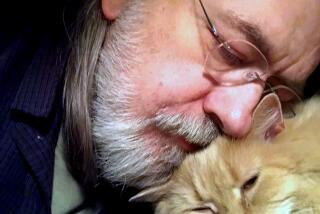Book Review : From Flawed World to a Flawed Utopia
- Share via
Walden Three by Jack Catran (Pygmalion Books/Jade Publications, Box 5567, Sherman Oaks, Calif. 91413): $14.95, paper; 422 pages)
“After all, when you get right down to it, what is the difference between (bull) and genius? Genius is when you get away with it.”
So writes Jack Catran in “Walden Three,” his big, blustery, sometimes silly but always earnest novel of utopianism in the post-industrial world. Catran, a space scientist and the author of an underground classic called “Is There Intelligent Life on Earth?” gives us the tale of an eccentric but charismatic genius from Brooklyn whose vision of a techno-behavioralist paradise is brought to life in the deserts of North Africa as a domed colony called Walden Three. Does Catran get away with it? Not quite, I’m afraid.
“Walden Three” is a showcase for a lot of good-natured philosophical claptrap about the flaws and failings of the world as we know it, and the glittering promise of science and technology as the answer to all our problems. In that sense, Catran comes across as a kind of angry but lovable crank.
“Here, for the first time, was a nonpolitical solution to the perplexing social problems of war as an instrument of economics, crime, congestion in transportation, poverty, unemployment, the destruction of natural resources, racial friction, poor housing and waste,” he writes, without a trace of irony, about his imagined utopia. “Walden Three would free humans from toil and enable them to make the most of themselves, with no limit placed upon their aspirations.”
No Real Surprises
Walden Three itself is an off-the-shelf technological conceit that offers no real surprises at all--a domed Shangri-La, providing its placid residents with the pleasures and conveniences of sonic showers, moving sidewalks, three-dimensional “video walls,” the attentions of an army of gifted and caring robots, and a “repertoire of approximately 600 varieties of food to select from.”
Unlike the despised “money world,” Walden Three shuns materialism but nevertheless enjoys fabulous wealth, technological supremacy and social perfection, all without any visible means of support. Its creator is a boy wonder from Bensonhurst in Brooklyn, Zak Tedesco, and the computer that governs Walden Three: “The computer makes all our decisions,” says one of the numerous characters, who essentially act as docents. “There are no moral judgments.”
Catran dresses up his utopian musings with occasional sexual adventures, insistent scatological humor, and a plot by the CIA, the KGB, the “Moral Plurality,” and various other agitators, conspirators and saboteurs who seek to destroy Walden. “I sensed the lurking danger threatening Walden from the savagery of the money world,” says the narrator of the book, another Brooklynite named Chuck Crandall. “They would never let it rest, let alone progress. The moralists, the righteous, the self-appointed guardians of the public trust, the suspicious government of my own country, the paranoid Soviets.”
Lots of Explanations
But the apocalyptic fate of Walden Three is clearly less important to Catran than his own social and technological prophecies. As a result, most of the time we spend in Walden Three is an occasion for demonstration and explanation, not action. “Life here was one long museum tour,” Chuck Crandall admits, “what with the dreary pontifical holier-than-thou admonitions on why science was better than anything. Still I was helplessly in love with the entire catastrophe.”
Catran’s novel has a heart, but it is not to be found in the cold, improbable and unappealing world of Walden Three. Rather, Catran insistently returns to the scene of his characters’--and his own--childhood, the Bensonhurst neighborhood of Brooklyn: “A locus, where literature, politics, science and the depression at once collided to fulfill a destiny, not of certainty, not of truth, but of untrammeled glory.”
In a sense, Catran has written two novels--one is a brittle work of ideological science fiction, the other is a blunt but affectionate memoir of his Brooklyn childhood. I enjoyed the excursion through the author’s memory to Brooklyn more than the one through his imagination to Walden Three.
Indeed, Catran seems to anticipate many of the perils he encountered in the writing of “Walden Three,” which is a flawed but funny and endearing book. “Unless the writer is extraordinarily gifted, books such as these inevitably become tracts,” his narrator muses, thereby writing his own critique of the book. “As is often the case when fact provides the underpinning of fiction, the result turns out not to be the best of both worlds, and may indeed embody the disadvantages of both worlds.”
More to Read
Sign up for our Book Club newsletter
Get the latest news, events and more from the Los Angeles Times Book Club, and help us get L.A. reading and talking.
You may occasionally receive promotional content from the Los Angeles Times.










